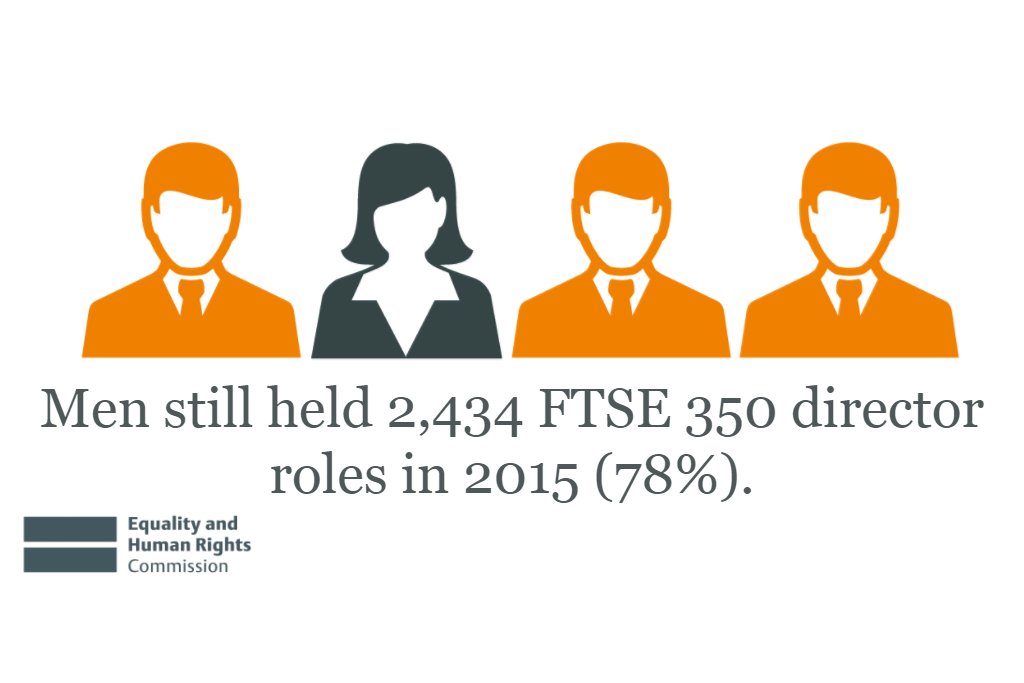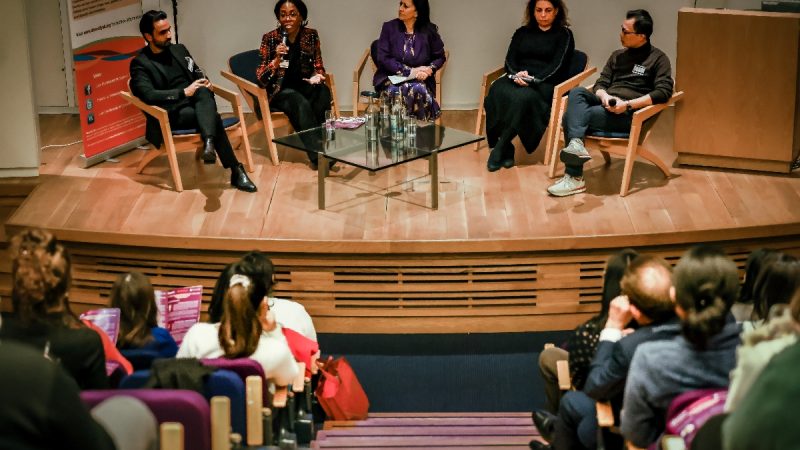Women on Boards initiative faltering in FTSE350

A major inquiry reveals that the headline progress of achieving 25% women across the boards of Britain’s biggest companies is masking a reality in which more than 60% of individual FTSE 350 companies (213) failed to meet the target. The ground breaking inquiry, published by the Equality and Human Rights Commission today (23rd March 2016), is the most detailed examination carried out into board level recruitment and appointment practices in the 350 FTSE companies. The inquiry examines the reasons why many companies have continued to fail to improve gender diversity and meet the targets set by Lord Davies.
Fewer than half (47%) of companies actually increased their female board representation over the period covered by the inquiry, while 46% of boards either remained the same or even decreased the proportion of women. Of the companies that increased the proportion of women on their boards, almost one third’s (31%) overall board size was reduced, rather than more women being appointed.
Old boys' networks still being used widely
It uncovers that outdated personal ‘old boys’ networks’ are still being used widely. Nearly a third of companies (32%) reported largely relying on the personal networks of current and recent board members to identify new candidates. Almost a third of companies using personal networks did not use any other means of advertising the post.
No open advertising of board roles
The diversity of applicants is also potentially being limited by virtually no open advertising of board roles - just 2% of companies publicise non-executive roles on their websites, in newspapers or on social media. Advertising in a range of media can provide more opportunities for diverse applicants and could lead to the appointment of more women to boards.
The inquiry also found that job descriptions often rely on vague terms like ‘chemistry’ and ‘fit’ rather than clearly defined skills and experience, limiting the potential diversity of candidate pools and standing in the way of women’s chances of appointment.
Despite the headline progress for the Index as a whole, the inquiry reveals an ‘inexcusable and unacceptable’ variation when it comes to individual company performance. Too few companies are taking action for improvement such as setting targets or encouraging applications from women.
For executive roles, the position remains even more stark. Nearly three quarters of FTSE 100 companies and 90% of FTSE 250 companies had no female executive directors at all on their boards during the period surveyed by the Commission.
The inquiry does however recognise that there has been progress made and welcomes the increase in the number of women in board positions. This number is now greater than ever before.
Recruitment practices remain 'shadowy and opaque'
It also highlights examples of good practice, including companies assessing diversity in their board evaluations; selecting candidates based on criteria set out in role descriptions; using interviews to assess candidates fairly, consistently and objectively and ensuring their processes encouraged diverse applications. Executive search firms were setting objectives to increase the number of women in appointment exercises.
Laura Carstensen, Equality and Human Rights Commissioner said; "Despite welcome progress and vital work by Lord Davies, our top Boards still remain blatantly male and white, with inexcusable and unacceptable discrepancies between companies.
'The good work of a forward thinking minority masks that many top businesses are still only paying lip service to improving the representation of women on boards.
'The best companies are showing that having talented women on their boards is boosting both performance and fairness. Unfortunately the recruitment practices of too many businesses still remain trapped in permafrost and that's holding back women and ultimately the companies themselves.
'The recruitment process to the boards of Britain's top companies remains shadowy and opaque and is acting as a barrier to unleashing female talent. Our inquiry calls for more open, fair and transparent recruitment to tackle an alarming disparity in performance across the FTSE 350."
Findings of the EHRC inquiry
The inquiry reveals:-
Women remain hugely outnumbered on individual company boards and particularly in executive director roles
- 45% (45) of FTSE 100 companies and 61% (213) of individual FTSE 350 companies have not reached the 25% target for women board members
- Men also outnumber women in senior positions in the FTSE 350 by a ratio of around 4:1 (senior management or executive committee positions)
- Three-quarters (79%) of companies have two or fewer women on their boards.
- Four in 10 (40%) companies have one or fewer women on their boards.
- Only 6% of the 350 organisations have more than three women on their boards, but 96% have three men or more.
- Nearly three quarters of FTSE 100 companies have no female executive director and 90% of the FTSE 250 have no female executive directors.
Personal networks limit the diversity of the candidate pool
- Companies with no women on their boards are more than twice as likely (67%) to rely on personal networks than companies with more women on their boards
Significant inconsistencies and question marks over diversity policies and practices
- The majority (59%) of companies undertake no specific activities to encourage applications from women for senior level or board appointments in the recruitment process.
- Some companies rely on personal recommendation without competition, or on informal interviewing unrelated to criteria in the role profile. Women candidates sometimes are asked potentially discriminatory questions about balancing work and family responsibilities.
- 55% of companies reported that they did not advertise board appointments.
- Although three-quarters (76%) of companies have board diversity policies,only just over a third (38%) of those set concrete objectives or targets to increase the number of women on their board.
Examples of good practice
- Some search firms were trying to widen their sources and databases to include more diverse candidates.
- Some companies encouraged applications by ensuring they had the right internal processes, for example, having a policy or guidelines, setting targets, conducting their own searches or benchmarking their performance against other companies.
- Around 9 in 10 companies used executive search firms to help fill roles, which can have a positive impact on the diversity of some appointments.
- Some companies offered specific programmes to women to develop their leadership potential.
- Alongside this, companies offered measures including flexible working, and support when returning from pregnancy to help retain female talent.
EHRC recommendations
In light of this major inquiry the Commission is setting out a series of recommendations to ensure companies make further progress to achieve diverse boards. These include:-
- Making boards accountable for improving diversity at executive team and board level, including reporting annually on progress in meeting targets.
- Conducting board evaluations and setting aspirational diversity targets for appointments, supported by policies and action plans.
- Ceasing reliance on personal networks and instead publicising roles through a wide range of channels, and using positive action to improve the diversity of the candidate pool.
- Establishing training, development and leadership programmes to improve the proportion of women at all levels of the company and improve the diversity of the pipeline for senior appointments.
- Using networking, mentoring and sponsorship programmes to encourage and support women to put themselves forward for board roles.
- Adopting management practices that support women’s career progression such as flexible and part-time working at senior levels.




